We’ve had some issues with emails going to hotmail, outlook and related addresses. If you’ve recently made a purchase using one of these and not received a confirmation email, please get in contact with us – use an alterative email address for contact or purchase if you can.

For all things fantasy, horror, and speculative fiction
Announcement:
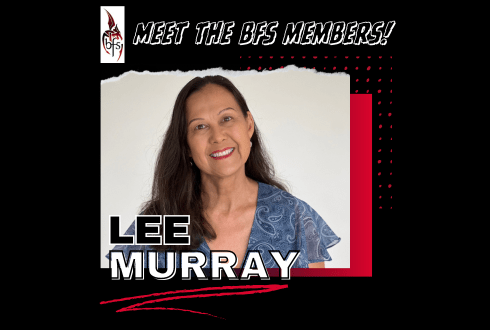
Meet Lee Murray
Every Friday, we meet a member of the BFS and peer deep into their soul (or, at least, a form they filled out). Want to be featured? Email us: online@britishfantasysociety.org
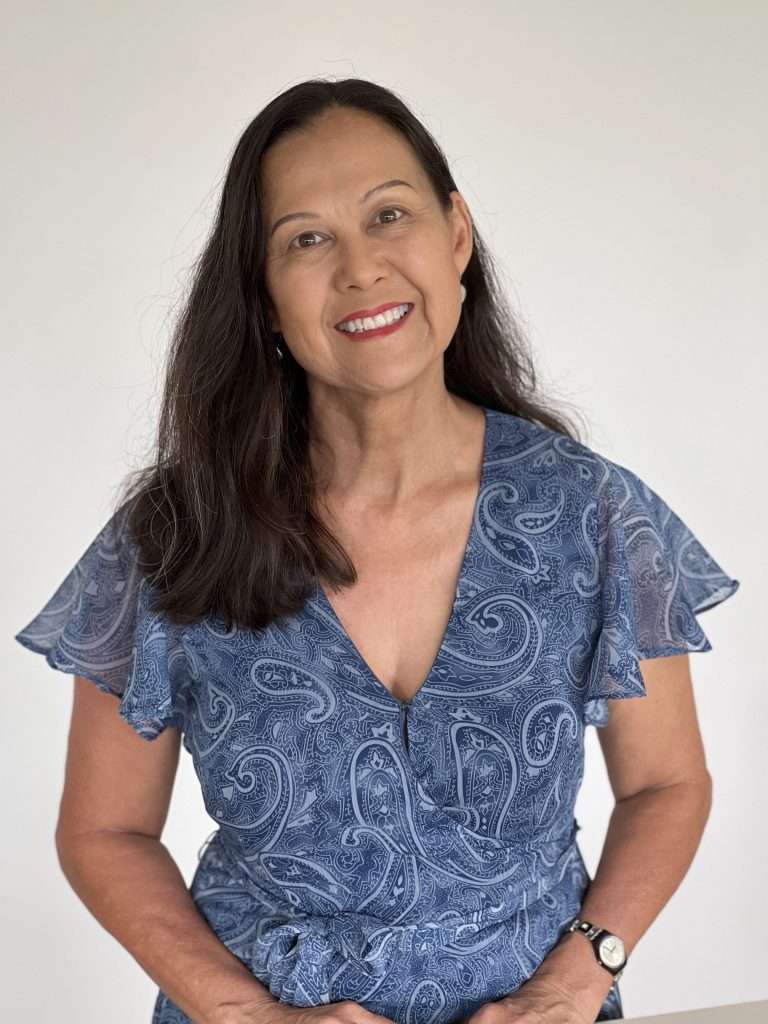
Name, including preferred pronouns
Lee Murray (she/her)
Which region are you based in?
I live a little further south than most BFS members, in Aotearoa-New Zealand. For those of you who may have visited here, you can find me about an hour east of Hobbiton, over the mountain range and on the coast in the sunny Bay of Plenty where I live with my well-behaved family and a naughty dog.
Genre you work in
Horror
If you don’t write, what do you do?
Read!
Are you drawn to any specific SFFH sub-genres?
While my first love is horror, and in particular Kiwi-centric horror, I’m completely feckless, writing all over the genre, including supernatural crime noir, historical horror, kaiju, military and action thrillers, dark fantasy, sci-fi horror, and Asian diaspora horror. I like to write at the intersection of culture and myth, and to play with structure and perspective. I also write in a number of forms including, novels, novellas, and short fiction, narrative prose-poetry and verse, non-fiction books and essays, and also screenplays.
Your influences
Tell us about the book/film/thing that got you into SFFH: What was it? How old were you? What impact did it have on you?
My first stories were speculative and told by my favourite storyteller, Morgan, who died two weeks into the pandemic, during New Zealand’s first lockdown. He was my dad, and he was world-famous in our family for his made-up bedtime stories. My first recollections of them date from when I was about two or three years old, so they’re among my earliest memories. My favourites were the tales of Horace and Aristotle, two bumbling and endearing little frogs who lived in the creek at the bottom of road in Whangarei. Let’s just say they weren’t always the brightest tools in the box—seriously, Aristotle, he was really dumb—but they were cheery little souls and full of derring-do. And you know, life can be perilous if you’re a frog; there are roads to cross and cats to outsmart, and even reaching the counter at the ice cream shop can be tricky. But Horace and Aristotle would brace themselves for adventure. They’d catapult themselves off the washing line, or they’d surfboard across the road on a sheet of corrugated cardboard, or swing in on a curtain cord (a plot event which I think George Lucas might have stolen). Dad (pictured below with small Lee) was a great performer too, adding his own special effects, giving his characters’ quirky voices, making funny noises, and adding humour and drama to his tales.
Anyway, the thing I learned from those stories, is that the little characters at the end of the road, from little countries at the bottom of the world, can achieve their goals if they dared to step out into the world, if they worked together. Shared their skills. Believed in one another. Lifted each other up. There is no obstacle too great. No conflict that can’t be resolved. And of course, that is the basis any good story.
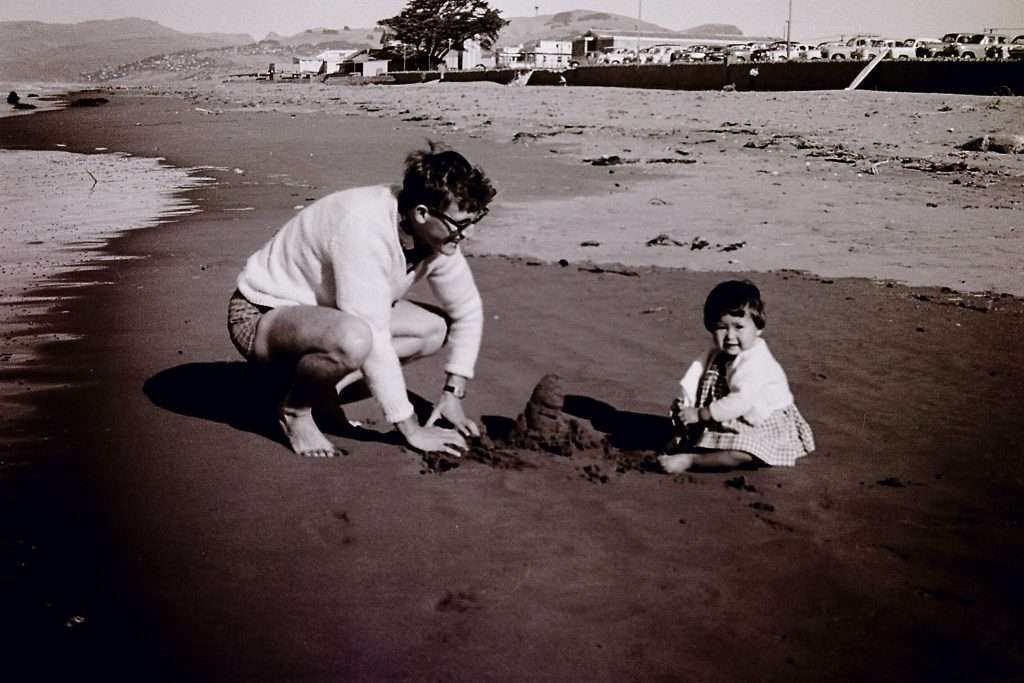
Later I grew up on Grimm’s fairytales, J.M. Barrie, C.S. Lewis, Tolkien, since in many ways New Zealand’s book industry and its school curriculum mirrored British offerings. I read the romantic poets, A Christmas Carol, Mary Shelley, Poe. That said, while growing up, I never saw a book or film that represented my experience as a Chinese New Zealander living in this isolated and wild landscape. John Wyndham’s apocalyptic novel The Chrysalids was the closest I came to ‘relating’ to a text, seeing myself as one of the mutant teens who escaped to New Zealand. So later, when I became a writer, and after I had discovered my penchant for darkness, I resolved to remedy that, to write the stories I wish had been there for me. To that end, most of my work involves New Zealand characters with a New Zealand context or theme.
How does that early influence show up in your work now?
I guess those early influences have taught me to write on themes that resonate for me, about people like me, because representation matters. I write horror for the hope, because in horror we can imagine a way though even the toughest situations. And what could be more challenging than the shifting sands of the publishing industry? Perhaps that explains why I am also an anthologist, bringing together writers of certain groups or on a theme, because there is power in critical mass and community.
Where do you draw your creative inspiration from?
This is a common question asked of authors. At workshops and schools when children ask me this question, I give them a naughty smile and say, “I steal them”. I explain to them how I steal character traits from people I know, splicing physical appearances and personalities together like Frankenstein to create new characters—some likeable and some not so nice. I steal people’s words, too; I’ll sit at cafés or on the bus, pretending to drink my coffee or look out the window, when in reality I’m eavesdropping on conversations, writing expressions and phrases into my notebook to extrapolate or exaggerate into a story of my own. I pinch mannerisms and points of view. Settings. Themes. If I need names for my characters, I’ll steal them from my friends’ list then, if it suits me to, I’ll gleefully kill them off. “I’ll steal your heart, your thunder, even the shirt off your back if it serves the story,” I tell my students. Writing is a subversive act and it’s important that children learn this as early as possible.
Who do you look to as a genre hero? Why?
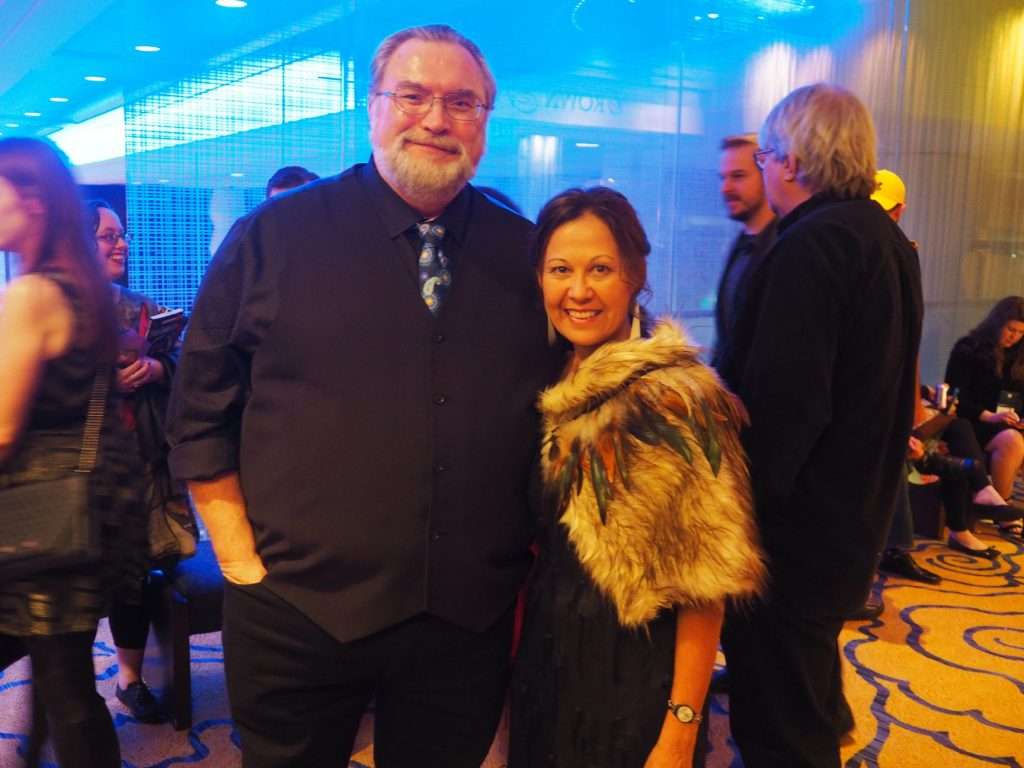
Jonathan Maberry (pictured left, with Lee) is one of my genre heroes. A NYT bestselling author of horror, thrillers, fantasy, and the weird, Jonathan isn’t just a fantastic writer, editor, and speaker, he’s a community treasure, developing, encouraging, and supporting new writers. If a rising tide lifts all boats, Jonathan is a tsunami. If I’m ever lucky enough to be someone’s genre hero one day, I’d like it to be for these reasons.
Your work
You’re stuck in an elevator for 60 seconds with that hero, and they want you to describe your work. Give us the pitch.
Weird and dark tales of the down-underworld. This doesn’t work. I wouldn’t buy me either. I think I’d be better selling a specific work rather than selling myself. I have Chinese heritage and Asian girls are conditioned not to put themselves first. We’re supposed to be quiet and unassuming. I’m more likely to ask what that person was working on themselves, or, if it’s an agent, ask what they’re looking for, and then pitch something—most likely a friend’s work. I’ve done that more than once. Come to think of it, this probably explains why I’ve never managed to snag an agent.
What are you working on right now?
A draft screenplay, a poetry collection, and I’m just getting started on a new novel. I’m a bit worried I’ve forgotten how to write a novel, although to be honest it always seems a bit magical how novels evolve, how your brain pulls everything together. Maybe I should see what I have in the drawer and what I would need to put together another short story collection sometime soon. I should probably write a newsletter too because I’m way behind on updates. At least my subscribers can’t accuse me of being spammy!
Thinking about all of your work you’ve done, which one sticks out most in your mind? Why?
Here is an excerpt from the author note of my upcoming narrative prose-poetry Fox Spirit on a Distant Cloud, which shows how a chance encounter became a turning point in my writing career:
Fox Spirit on a Distant Cloud would not exist were it not for an auspicious encounter I had as an international guest at GenreCon literary conference in Brisbane, Australia in November 2019. It was there that I met Geneve Flynn, a Chinese Australian writer, when, true to the conscientious Chinese girl trope, we both turned up to a panel session well ahead of time. In the half hour before everyone else arrived Geneve and I talked about the impact of those pervasive Asian tropes on our lives, the traditions we embraced and those we rejected, and the burden of expectation placed on Asian women, particularly in the context of western society. Why was there no work on this theme, we asked. Where was the anthology dedicated to Asian women’s narratives? Shared connection is a powerful thing. By the time the conference ended we had a basic premise for Black Cranes: Tales of Unquiet Women and a list of potential authors. Within a month we had a publisher on board. Then, in March 2020, the pandemic struck. With the world at an impasse, we considered postponing or even cancelling the project, but when we canvassed our contributors the response was a resounding no. The project was too important, they said. No one had ever asked them to write about their Asian heritage before and with anti-Asian sentiment and attacks on the rise, it was more important than ever that the world should hear their voices. Our crane sisters urged us to carry on. Black Cranes was published in September 2020 and in the words of one reviewer became ‘an instant classic’. Reader response was overwhelming with the book going on to win the Bram Stoker- and Shirley Jackson Awards and shortlisting in the Aurealis-, Australian Shadows-, and British Fantasy Awards…
In the aftermath of Black Cranes, Geneve and I realised there was a hunger for work exploring the Asian diaspora experience, and not only from readers. We had so much more to say. So, buoyed by collective courage, we teamed up with our crane-sisters, award-winning poets Angela Yuriko Smith and Christine Sng, and wrote Tortured Willows: Bent, Bowed, Unbroken, a poetry collaboration on the themes of otherness, expectation, and generational trauma. Imagine our surprise when Tortured Willows also won a Bram Stoker Award. The work was shortlisted for numerous other awards, and ‘cheongsam’, one of my poems from the collection, gained the Australian Shadows Award for poetry. Not only that: a sisterhood of Asian women writers had gathered around us, clamouring to tell their stories, to be heard. I became immersed in Asian women’s narratives, writing ‘The Moon Goddess’s Granddaughter’, a prose-poetry piece on domestic abuse for the Pixel Project’s Giving the Devil its Due, and co-editing Unquiet Spirits: Essays by Asian Women in Horrorwith Angela Yuriko Smith, which was released in 2023 by Black Spot Books.
That first encounter with Geneve Flynn also inspired me to develop my own work on the topic, with the proposal for Fox Spirit on a Distant Cloud, my first solo prose-poetry collection (or novel in prose), winning me my first fellowship and a stipend from the Grimshaw Sargeson Trust, and the completed manuscript going on to win the 2023 NZSA Laura Solomon Cuba Press Prize for unique and innovative writing. I can’t wait to share the book with everyone when it comes out later this year.
Here is the back cover text:
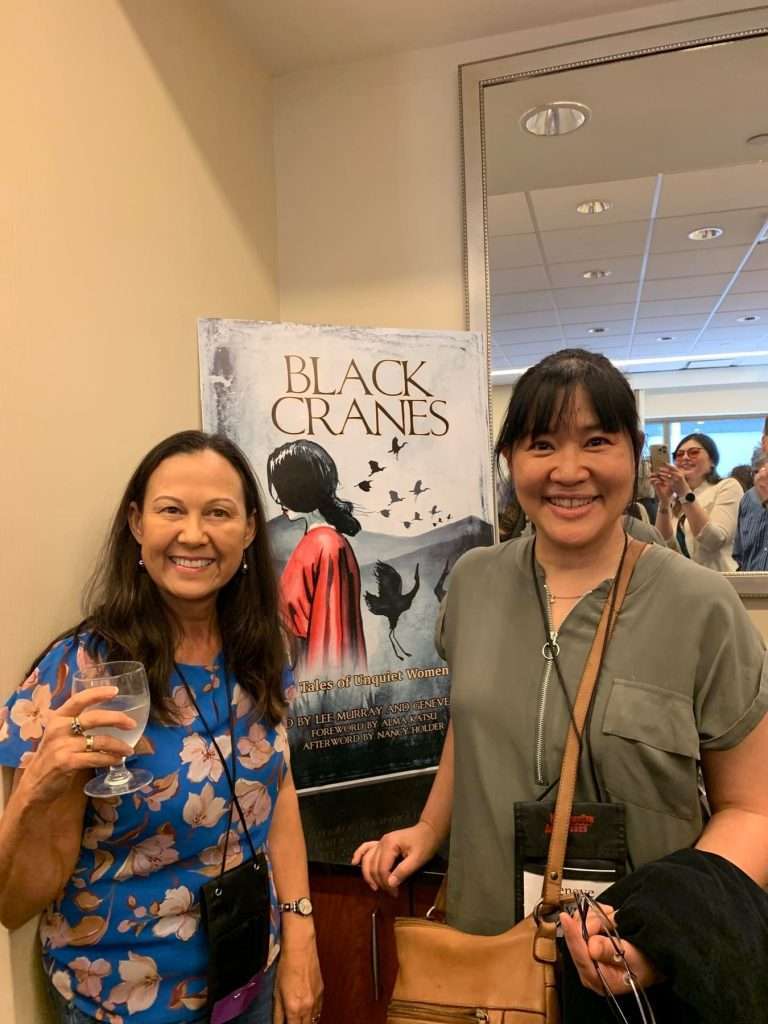
Wellington, 1923, and a sixty-year-old woman hangs herself in a scullery; ten years later another woman ‘falls’ from the second floor of a Taranaki tobacconist; soon afterwards a young mother in Taumarunui slices the throat of her newborn with a cleaver. All are women of the Chinese diaspora, who came to Aotearoa for a new life and suffered isolation and prejudice in silence. Chinese Pākehā writer Lee Murray has taken the nine-tailed fox spirit húli jīng as her narrator to inhabit the skulls of these women and others like them and tell their stories. Fox Spirit on a Distant Cloud is an audacious blend of biography, mythology, horror and poetry that transcends genre to illuminate lives in the shadowlands of our history.
Where and when do you create/are you at your most creative?
I write full time (all the time, too much time) from my home office overlooking a cow paddock. My husband of 35 years, a software engineer (and my tech troubleshooter), shares the office. The room is furnished with a squishy sofa, an armchair, and a bookcase, we have our desks facing one another in Victoria & Albert style. Only his screen has gotten bigger and bigger over the years—it’s currently 117cm by 35cm—so I can no longer see him at all. Or rather, he cannot see me. I think perhaps he is trying to tell me something.
Some of my most creative times are when I’m out walking the dog with my husband or with my long-time writer friend and collaborator, Piper Mejia. Something about being outside and chatting helps to jostle the brain cells. The spa pool is another good spot for overcoming those gnarly plot holes. Something in the steam, I think.
What’s the best advice you’ve received about creativity?
None specifically springs to mind. But I often tell new writers that they should learn to grow a carapace because writing is a very tough gig.
What’s your writing soundtrack?
My favourite writing soundtrack is wind and rain on the roof, waves on the beach, and my (now adult) children giggling over something in the next room.
The quickfire round
Sci-fi, fantasy or horror? Definitely leaning to horror.
Quiet or loud? Unquiet women!
Dark or light? Tending to the dark side. Remembering that horror walks hand in hand with hope.
Strict lines or genre blend? A blend. Because alloys have strength.
Awards or bestseller? Yes, please! That would be lovely.
Fiction or non-fiction? Both, with a slight preference for fiction. That said, I always have a hundred tabs open, links to references and articles which inform and inspire my work. So this is clearly a trick question.
Poetry or prose? Another trick question. I am an accidental poet. In the past, seeing myself mainly as a writer of prose, I would attend poetry courses and workshops in an effort to transform my work into something lyrical and poetic, and over the years I found poetry creeping into everything: my short stories, essays (or rather messays), and even forewords. Only recently have I been brave enough to call myself a poet.
Plotter or pantser? Hmm. I’m a vaguely plottery pantser. I usually have an idea of where I want to go and no idea how I’m going to get there. For short stories, I simply write.
Reading or listening? Reading.
Notebook or computer? Computer. Mainly because I can barely read my own scribble. However, I keep my to-do lists in a notebook along with fragments of poetry.
Favourite SFFH book of all time? Way too hard. How about a couple of recent favourites? Serpent’s Wake: A Tale for the Bitten by Lauren Elise Daniels. Lone Women by Victor LaValle.
Any SFFH author on auto-buy? So many. At my current rate, I will have to live until I am 473 in order to get through them all. And some of those I’ll have to skim read. Here are some of my faves: Kaaron Warren, Dan Rabarts, Geneve Flynn. Jonathan Maberry.
Favourite podcast? Again, this is hard. There are so many good ones. And podcasts can be listened to after the fact, which is helpful when you live in a far-off time-zone like I do. Rather than mention any single podcast, I will say that I especially love a podcast hosted by Angela Yuriko Smith, and there have been many over the years. I love her conversational approachable style.
The home stretch
What’s the best thing about being a SFFH writer/agent/publisher/reader/fan?
In New Zealand we have a Māori proverb that asks what is the most important thing. The answer: He tangata he tangata he tangata! It is the people, the people, the people.
And other than connecting with like-minded folks and lovers of story, I love the alchemy of converting coffee into words and being able to come to work in my pyjamas.
My career highlight to date? I have just been awarded New Zealand’s Prime Minister’s Award for Literary Achievement in Fiction, the first Chinese New Zealander to ever achieve this accolade, one of the country’s highest awards. This is simply epic. I’m still reeling to have my name appear alongside New Zealand’s literary heavyweights. It’s truly humbling. You can read about that is here and here.
Time to plug your stuff! Where can we find you and your work? What have you got coming up? Consider this your advertising space.
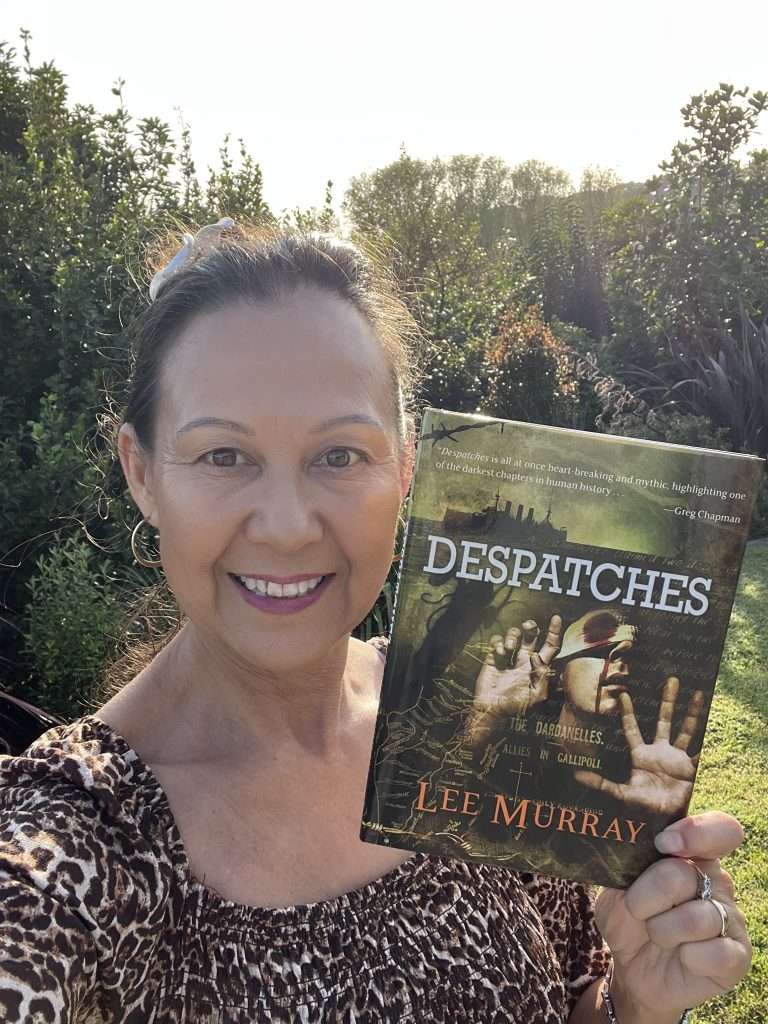
Look out for Fox Spirit on a Distant Cloud as mentioned above, and also Grafted, a weird science, Asian-Kiwi coming of age horror feature film from Bafta-nominated director Sasha Rainbow, which I co-wrote and which releases in 2024.
Other recent releases include cosmic horror war novella Despatches from editor Marie O’Regan at Absinthe Books / PS Publishing which released in September 2023, dark fiction anthology Remains to be Told: Dark Tales of Aotearoa edited by Lee Murray (October 2023 from Clan Destine Press), and Under Her Eye, a women in horror poetry anthology on domestic violence edited by Lindy Ryan and Lee Murray from Black Spot Books.
Lee’s official bio
Lee Murray is a writer, editor, poet, and screenwriter from Aotearoa. A USA Today Bestselling author, her titles include the Taine McKenna Adventures, supernatural crime-noir series The Path of Ra (with Dan Rabarts), fiction collection Grotesque: Monster Stories, and several books for children. Her many anthologies include Hellhole, Black Cranes (with Geneve Flynn), and Unquiet Spirits (with Angela Yuriko Smith), and her short fiction appears in Weird Tales, Space & Time, and Grimdark Magazine. A multiple Bram Stoker®-, Australian Shadows-, and Sir Julius Vogel Award-winner, Lee is New Zealand’s only Shirley Jackson Award winner. Winner of New Zealand’s Prime Minister’s Award for Literary Achievement, she is also an NZSA Honorary Literary Fellow, a Grimshaw Sargeson Fellow, and the 2023 NZSA Laura Solomon Cuba Press Prize winner. Read more at leemurray.info